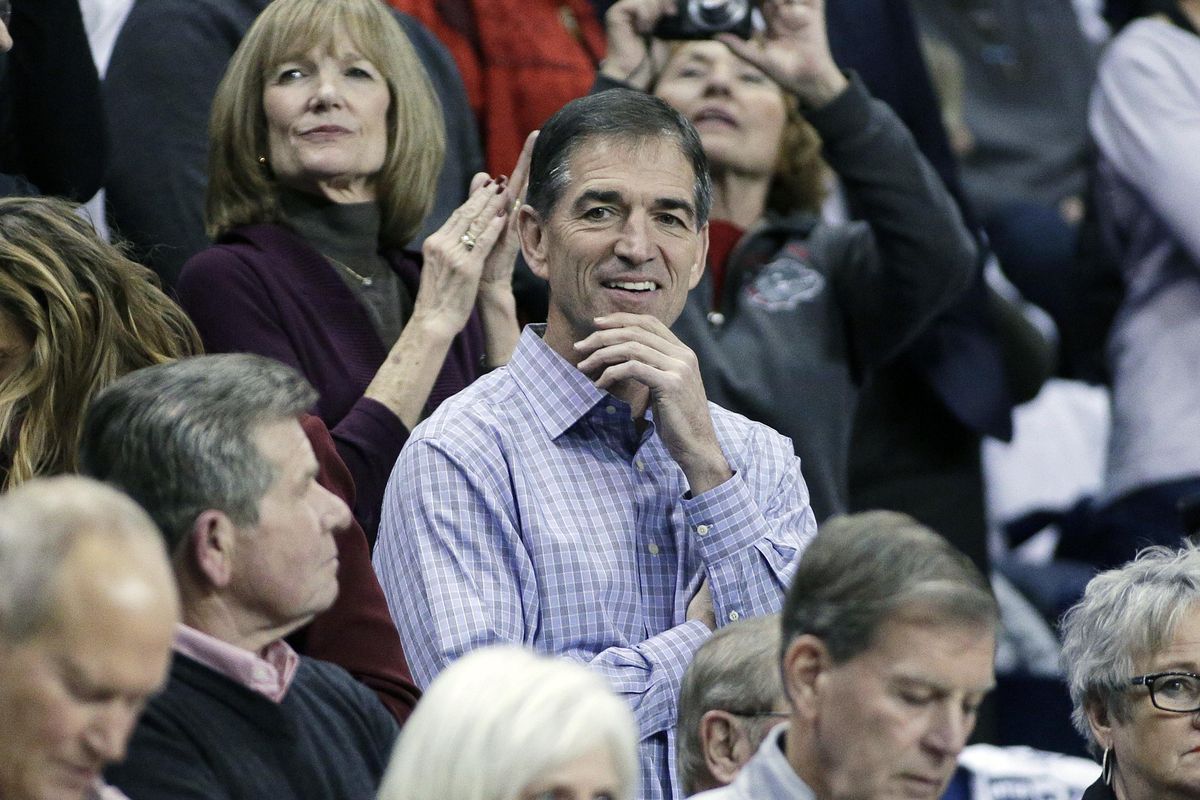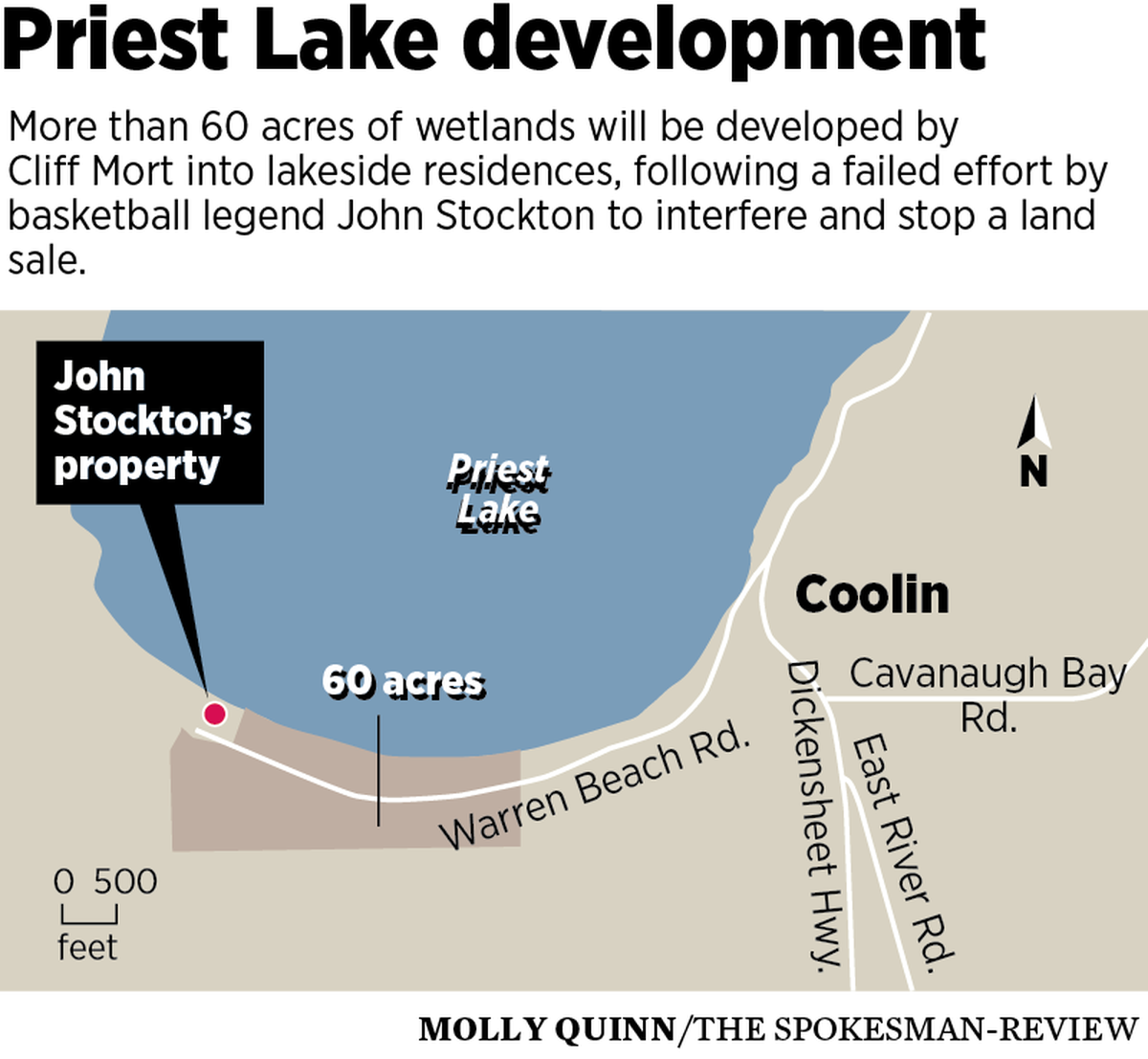John Stockton’s bid to block development on Priest Lake wetlands falls short
Retired NBA player and Gonzaga alumnus John Stockton, center, looks on before an NCAA college basketball game between Gonzaga and Washington in Spokane on Dec. 7, 2016. Stockton failed in a bid to block the development of 65 acres of wetlands near his Priest Lake residence, according to an Idaho judge’s decision issued in February 2019. (Young Kwak / AP)
Basketball legend John Stockton failed in a bid to block the development of 65 acres of wetlands near his Priest Lake residence, according to an Idaho judge’s decision issued earlier this month.
Along with another neighbor, Todd Brinkmeyer, Stockton tried to stop a contracted sale and the construction of multiple lakefront properties on undeveloped wetlands on the south end of Priest Lake. Instead, Stockton, Brinkmeyer and the original owners of the wetlands property engaged in a conspiracy to interfere with the sale.
Under the judge’s order, Stockton and Brinkmeyer now must sell the land at a loss to the developer, Tricore Investments.
“Instead of doing this the right way, Stockton and Brinkmeyer just went in and interfered and played cute with it,” said Kevin Roberts, a Spokane lawyer who represented the owners of Tricore. “It’s great that they have the means to have lakeside cabins on Priest and be able to enjoy it, but effectively they’re trying to stop everybody else from doing that.”
Calls to Stockton and Brinkmeyer’s lawyers were not returned.
The land in question was owned for decades by Bill and Elaine Warren, who died in 1992 and 2003, respectively. Their sons, Dan and Chris, inherited the land.

Brinkmeyer’s parents purchased some waterfront property from the Warrens in the 1980s, and he inherited the land following the death of his mother in 2003. Brinkmeyer is the founder and president of Plummer Forest Products.
Stockton – who grew up in Spokane and attended Gonzaga University before spending his professional career with the Utah Jazz – has owned land near Coolin on the lake since 1989, according to court documents. When he purchased land from the Warrens that year, he agreed to move his property line to allow the Warrens to sell additional lakefront property to the Brinkmeyer family.
Because of this, the Warrens agreed to give Stockton “the first right to purchase any additional Priest Lake property they offered for sale,” according to court records.
In July 2015, Dan and Chris Warren decided to sell two parcels totaling 45 acres for $2 million. Aware of their parents’ promise to Stockton, they emailed both Stockton and Brinkmeyer to see if they were interested in the land. Neither responded or showed interest, court records say.
Instead, Clifford Mort, who owns Tricore with his wife, Becky, began negotiations with the Warrens.
Mort, a builder and real estate developer based in Coeur d’Alene, is responsible for numerous lake- and riverside communities in the region, including Coyote Rock in Spokane Valley and the Mill River developments in Post Falls.
Mort made his first offer on the property in October 2015, but he and the Warren brothers had numerous negotiations over the course of a year, which ultimately led to an agreed sale price of $2.4 million for 65 acres. At issue was the amount of undeveloped waterfront, the time needed to conduct a feasibility study addressing the property’s wetlands and access to potable water, among other points.
In June 2016, Mort’s Tricore and the Warrens signed a new sale agreement, but negotiations continued.
Two months later, in August 2016, “the Priest Lake community was buzzing with rumors” that the land would be developed, according to court documents. Brinkmeyer “deduced” that the developer was Mort, who was his neighbor in another community Mort developed along the Spokane River near Post Falls called Timber River.
Brinkmeyer texted Mort, and the two met for a meeting and lunch, where Mort shared his plans for the Priest Lake property.
Four days after the meeting, Brinkmeyer and Stockton met in their Priest Lake backyards and formulated a plan to purchase the property together and stop the development. Stockton had thought the property was impossible to develop because of the wetlands, but after hearing of Mort’s plans, he “resolved to try to find a way to preserve the wetlands,” according to court documents.
Stockton contacted Cheryl Moody, a wetland scientist with the Selkirk Conservation Alliance, to discuss ways to “control” the property, noting that he “may need to rally the troops.”
As negotiations continued between Mort and the Warrens, Stockton and Brinkmeyer approached the Warrens and offered more money than Mort had on the table. The Warrens agreed and set the sale’s closing date at Sept. 6, 2016 – three days before the deal with Mort was to close.
Stockton and Brinkmeyer’s sale closed, and the Warrens did not inform Mort. Instead, Mort’s company continued with negotiations, even paying $10,000 in earnest money to extend the closing date of the sale, and finishing a wetland report from an expert to assist with a plan to “purchase credits from a local wetlands bank to allow it to develop the wetlands on the 65 acres.”
Bonner County’s Valencia Wetlands Bank has “plenty of credits to sell” but those would cost $2 million to compensate for the loss of wetlands on the property, court records say.
Mort’s company only found out about the sale near the end of September 2016, when it contacted a title company and was given a copy of the new deed. Mort’s company filed a lawsuit against the Warren estate, the Warren brothers, Stockton and Brinkmeyer on Oct. 6, 2016.
Two years later, after a six-day trial that ended on Nov. 2, a jury found the Warrens, Brinkmeyer and Stockton in the wrong, saying they had engaged in a “conspiracy” to “accomplish an unlawful objective.”
U.S. District Judge Barbara Buchanan ordered the at-fault parties to pay Tricore’s costs and attorney’s fees.
Additionally, Stockton and Brinkmeyer must sell the land to Mort’s Tricore for $2.4 million within 60 days of the ruling.

